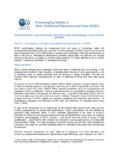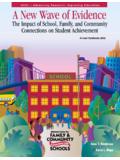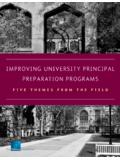Transcription of Maintained nursery schools: the state of ... - Early Education
1 Maintained nursery schools: the state of play report March 2015. Funded by Early Education Executive Summary Why Maintained nursery schools matter Maintained nursery schools are local authority schools. They provide Education and other services to children under 5 and their families. They: Provide high quality Early Education , led by specialist headteachers, and delivered by qualified teachers and nursery nurses. Integrate care, Education , health and other services for children, so that all aspects of a child's development can be supported. Put parents and families at the centre of their work. Share their expertise with other Early Education and childcare providers, so that all children benefit. Are concentrated in disadvantaged areas: 64% are in the 30% most deprived areas of England.
2 Give priority in their admissions to disadvantaged children and children with special educational needs and disabilities and have the expertise and skills to support them successfully. Are successful at closing the gap between the most disadvantaged children and their peers. They are able to do this because of the quality of the Education they provide. 57% of Maintained nursery schools are rated outstanding by Ofsted, and 39% are rated good. No other part of the Education sector even approaches this standard. Moreover, in other sectors, quality of Education provision is linked to the affluence of the area, while the quality of nursery schools is consistently high regardless of local levels of deprivation. Her Majesty's Chief Inspector of Schools confirms this: The only Early Education provision that is at least as strong, or even stronger, in deprived areas compared with wealthier areas is nursery schools (Ofsted, 2014).
3 nursery schools under threat Maintained nursery schools are world leaders in developing and delivering high quality Early childhood Education and care. But increasingly they are struggling to survive. A third of Maintained nursery schools in England have closed since 1980: only just over 400 remain, and many face continual uncertainty as to their future. The threats to their survival are both financial and structural: There is significant variation between local authorities in how well nursery schools are funded, and an ongoing erosion of their funding as austerity continues to bite. nursery schools are caught between a rock and a hard place: they are required to employ a head and qualified teachers, and meet the costs of being a school without the economies of scale of a primary school; but they are only required to be funded on the same level as private and voluntary providers who can employ much lower qualified, cheaper staff.
4 2. Maintained nursery schools: the state of play report They are expected to operate in a competitive market without having the same freedoms as their competitors, as local authorities determine whether they can expand their number of places or age range. They are not able to become academies or co-operative trusts to operate as part of the family of schools, but outside local authority control. Without urgent action, nursery schools will soon disappear. Once lost, the cost of rebuilding an equivalent reservoir of expertise in Early years Education would be prohibitive. A rational system would make best use of the highest quality provision for the most disadvantaged children, and as beacons of good practice for the sector as a whole. Instead, we are allowing our finest Early years provision to be lost in the interests of short-term cost savings.
5 Summary of recommendations 1. Government should promote the expansion of nursery schools into those local areas where they are not currently present in particular the most deprived areas, to mitigate market failure and recognise the greater need for quality Early Education to close the gap for the most disadvantaged children. 2. Urgent action needs to be taken to stabilise funding for Maintained nursery schools at a level sufficient to cover costs of a full-time headteacher and appropriate numbers of qualified teachers, through binding guidance to local authorities. 3. Priority should be given to maximising take-up of high quality provision in nursery schools, in particular for the most disadvantaged children including funded 2-year-olds.
6 4. The expertise of Maintained nursery schools in providing suitable places for children with SEND, and sharing their expertise with the sector, must be protected and enhanced. 5. The value of nursery schools' additional services including working with families and supporting vulnerable children should be recognised and funded. 6. The capacity of nursery schools to improve the Early Education and childcare system should be recognised, funded and effectively deployed, in partnership with local authorities and as part of a self-improving school and Early years system. 7. When commissioning children's centres, local authorities should be required to take into account the holistic needs of young children, and to prioritise the involvement of nursery schools in providing integrated services.
7 They should explicitly take into account the social value of nursery schools with their local relationships, knowledge and embeddedness in the community. 8. A national approach is needed to succession planning and identifying and developing the next generation of nursery school heads and sector leaders. 9. nursery schools should be given greater freedoms to innovate eg to extend their age range to 2-year-olds and below, or offer Reception classes; and to become academies and cooperative trusts. 3. Early Education Introduction: why nursery schools matter Just read our Ofsted report! We provide a safe, secure environment where children feel safe - brilliant experienced staff who have excellent relationships with both children and parents.
8 The children leave the nursery as confident little people who have a love of learning and who, we know from tracking the children and our strong relationship with neighbouring schools, make very good progress in primary school. nursery school head, North West England Maintained nursery schools are local authority funded schools, with a headteacher and qualified teachers leading a team of specialist Early years practitioners. They provide Education for 3-4-year-olds (and increasingly for 2-year-olds). They are few in number - just over 400 remain in England but represent a unique reservoir of Early years expertise. 97% of them are rated good or outstanding by Ofsted, a standard not matched by any other part of the Education sector (see Figure 1).
9 Figure 1: Percentage of providers by Ofsted judgement (31 Aug 2014). nursery schools 57 39 4. Early years (all providers) 12 65 21 1. All schools ( nursery , primary &. 20 61 17 3. secondary). 0% 50% 100%. Outstanding Good Satisfactory/Requires Improvement Inadequate However, Ofsted ratings fail to capture the uniqueness of the Maintained nursery school sector, which does much more than providing Early Education and care: nursery schools are concentrated in disadvantaged areas (64% of them are in the 30% most deprived areas), and Ofsted judgements show they have an excellent track record on the progress of pupils, including those from disadvantaged backgrounds. As a consequence of local authority referrals, they support higher than average concentrations of children with SEND and share their expertise in Early identification and support with other settings.
10 4. Maintained nursery schools: the state of play report Many nursery schools are integrated with children's centres, providing integrated services ( Education , health, social care, etc), which research shows are most effective for the under 5s. nursery school staff are experienced in working in multi-professional teams. Both integrated and stand-alone nursery schools have a strong record of extensive work with parents and families and acting as hubs for their local communities. Working with parents to improve the home learning environment has been shown to be a key factor in improving children's outcomes. nursery school headteachers are a unique cadre of specialist Early years leaders who are highly qualified and knowledgeable about Early years pedagogy.







